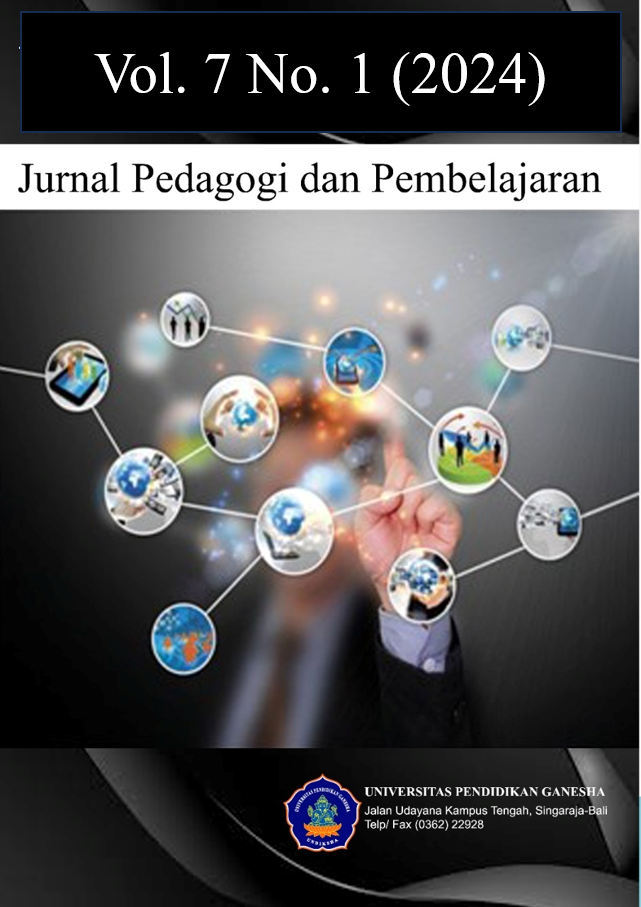Principals’ Delegation of Functions and Teachers’ Job Performance Amidst Covid-19 Pandemic in Public Senior Secondary Schools
DOI:
https://doi.org/10.23887/jp2.v7i1.70213Keywords:
Principals’ Delegation of Functions, Teachers’ Job Performance, Covid-19 PandemicAbstract
There are a lot of impact of the COVID-19 pandemic on principals' delegation functions and teachers' job performance in a public Senior Secondary school. The study aimed to analyze the level at which principals delegate functions to teachers, the relationship between principals' delegation function techniques and teacher job performance, and the factors that hinder effective delegation practices. A descriptive survey research design was used with 1604 teachers and principals from 38 public secondary schools. Four research questions were raised to guide the study. Data collection was conducted using a self-structured questionnaire. The results showed that principals used various delegation functions and techniques during the pandemic, such as delegating departmental heads to monitor teachers' performance, assigning form masters to enforce school rules, directing heads of departments to mark lesson notes, cross-checking teachers' comments on student report cards, demanding reports from parent-teacher associations, and cross-checking departmental head teachers' classroom attendance books. These delegation functions and techniques were found to be effective in enhancing teachers' morale, meeting curriculum outlines, and achieving educational goals. The pandemic has driven the need for adaptable school leadership, and the efficiency of principals' delegation functions must be improved to boost teacher morale and ensure the achievement of educational goals.
References
Ahmmed, S., Saha, J., & Tamal, M. A. (2022). An empirical study for determining the quality indicators for the primary and secondary school of Bangladesh: A structural equation modeling approach. Heliyon, 8(10), e10870.1-9. https://doi.org/10.1016/j.heliyon.2022.e10870. DOI: https://doi.org/10.1016/j.heliyon.2022.e10870
AlAjmi, M. K. (2022). The impact of digital leadership on teachers’ technology integration during the COVID-19 pandemic in Kuwait. International Journal of Educational Research, 101928. https://doi.org/https://doi.org/10.1016/j.ijer.2022.101928. DOI: https://doi.org/10.1016/j.ijer.2022.101928
Anastasiou, S., & Papagianni, A. (2020). Parents’, teachers’ and principals’ views on parental involvement in secondary education schools in Greece. Education Sciences, 10(3). https://doi.org/10.3390/educsci10030069. DOI: https://doi.org/10.3390/educsci10030069
Bahago, S. B. & J. B. (2022). E-Counselling Accessibility amidst Covid-19 Pandemic among Secondary School Students in Southern Kaduna State, Nigeria. African Scholars Journal of Education Research and Library Practice(JERLP-8), 24(8), 99–120. https://www.africanscholarpublications.com/wp-content/uploads/2022/05/AJERLP_Vol24_No8_March_2022-8.pdf.
Bieser, J. C. T., & Hilty, L. M. (2020). Conceptualizing the impact of information and communication technology on individual time and energy use. Telematics and Informatics, 49(February), 101375. https://doi.org/10.1016/j.tele.2020.101375. DOI: https://doi.org/10.1016/j.tele.2020.101375
Bush, T., & Glover, D. (2016). School leadership and management in South Africa. International Journal of Educational Management, 30(2), 211–231. https://doi.org/10.1108/IJEM-07-2014-0101. DOI: https://doi.org/10.1108/IJEM-07-2014-0101
Cantú-Ortiz, F. J., Galeano Sánchez, N., Garrido, L., Terashima-Marin, H., & Brena, R. F. (2020). An artificial intelligence educational strategy for the digital transformation. International Journal on Interactive Design and Manufacturing, 14(4), 1195–1209. https://doi.org/10.1007/s12008-020-00702-8. DOI: https://doi.org/10.1007/s12008-020-00702-8
Cheng, Y. C., Hung, F. C., & Hsu, H. M. (2021). The relationship between academic dishonesty, ethical attitude and ethical climate: The evidence from Taiwan. Sustainability (Switzerland), 13(21), 1–16. https://doi.org/10.3390/su132111615. DOI: https://doi.org/10.3390/su132111615
Gudmundsdottir, G. B., & Hatlevik, O. E. (2018). Newly qualified teachers’ professional digital competence: implications for teacher education. European Journal of Teacher Education, 41(2). https://doi.org/10.1080/02619768.2017.1416085. DOI: https://doi.org/10.1080/02619768.2017.1416085
Gümüş, S., Hallinger, P., Cansoy, R., & Bellibaş, M. Ş. (2021). Instructional leadership in a centralized and competitive educational system: a qualitative meta-synthesis of research from Turkey. Journal of Educational Administration, 59(6), 702–720. https://doi.org/10.1108/JEA-04-2021-0073. DOI: https://doi.org/10.1108/JEA-04-2021-0073
Hashim, H. (2018). Application of Technology in the Digital Era Education. International Journal of Research in Counseling and Education, 1(2), 1. https://doi.org/10.24036/002za0002. DOI: https://doi.org/10.24036/002za0002
Iivari, N., Sharma, S., & Ventä-Olkkonen, L. (2020). Digital transformation of everyday life – How COVID-19 pandemic transformed the basic education of the young generation and why information management research should care? International Journal of Information Management, 55(June), 102183. https://doi.org/10.1016/j.ijinfomgt.2020.102183. DOI: https://doi.org/10.1016/j.ijinfomgt.2020.102183
Ismail, S. N., Omar, M. N., & Raman, A. (2021). The authority of principals’ technology leadership in empowering teachers’ self-efficacy towards ict use. International Journal of Evaluation and Research in Education, 10(3), 878–885. https://doi.org/10.11591/ijere.v10i3.21816. DOI: https://doi.org/10.11591/ijere.v10i3.21816
Karakose, T., Polat, H., & Papadakis, S. (2021). Examining Teachers’ Perspectives on School Principals’ Digital Leadership Roles and Technology Capabilities during the COVID-19 Pandemic. In Sustainability (Vol. 13, Issue 23). https://doi.org/10.3390/su132313448. DOI: https://doi.org/10.3390/su132313448
Mee Mee, R. W., Shahdan, T. S. T., Ismail, M. R., Abd Ghani, K., Pek, L. S., Von, W. Y., Woo, A., & Rao, Y. S. (2020). Role of gamification in classroom teaching: Pre-service teachers’ view. International Journal of Evaluation and Research in Education, 9(3), 684–690. https://doi.org/10.11591/ijere.v9i3.20622. DOI: https://doi.org/10.11591/ijere.v9i3.20622
Nurabadi, A., Irianto, J., Bafadal, I., Juharyanto, Gunawan, I., & Adha, M. A. (2021). The effect of instructional, transformational and spiritual leadership on elementary school teachers’ performance and students’ achievements. Cakrawala Pendidikan, 40(1), 17–31. https://doi.org/10.21831/cp.v40i1.35641. DOI: https://doi.org/10.21831/cp.v40i1.35641
Ogolodom, M. P., Mbaba, A. N., Okpaleke, M. S., Chukwueze, I. O., Okankwu, E. A., Joseph, D. Z., Alazigha, N., Orevaoghene, O. E., & Brownson, E. E. (2022). Online Learning in Nigerian Universities During Covid-19 Pandemic: the Experiences of Nursing and Radiography Undergraduate Students. Journal of Radiology Nursing, 234, 1–8. https://doi.org/10.1016/j.jradnu.2022.08.012. DOI: https://doi.org/10.1016/j.jradnu.2022.08.012
Ojetunde, S. M. (2020). Impact Evaluation of Effects of COVID-19 Pandemic on Education and Economy. International Journal Education Benchmarck, 16(2, May/July 2020), 99–108. https://doi.org/2489-4162.
Oluwadayisi, A. L. (2018). Ethics and Moral Education in Nigeria: Challenges and Remedies. African Journal of Teacher Education, 7(1), 16–23. https://link.springer.com/chapter/10.1007/978-3-031-13814-0_11.
Prachagool, V., Nuangchalerm, P., & Yawongsa, P. (2022). Digital Literacy of Pre-service Teachers in the Period Time of COVID-19 Pandemic. Journal of Educational Issues, 8(2), 347. https://doi.org/10.5296/jei.v8i2.20135. DOI: https://doi.org/10.5296/jei.v8i2.20135
Rockenbach, A. N. (2020). Character Education for the Public Good: The Evolution of Character Capacities in and Beyond College. Journal of College and Character, 21(1), 6–13. https://doi.org/10.1080/2194587x.2019.1696834. DOI: https://doi.org/10.1080/2194587X.2019.1696834
Rodríguez-Abitia, G., & Bribiesca-Correa, G. (2021). Assessing digital transformation in universities. Future Internet, 13(2), 1–17. https://doi.org/10.3390/fi13020052. DOI: https://doi.org/10.3390/fi13020052
Rostini, D., Syam, R. Z. A., & Achmad, W. (2022). The Significance of Principal Management on Teacher Performance and Quality of Learning. Al-Ishlah: Jurnal Pendidikan, 14(2), 2513–2520. https://doi.org/10.35445/alishlah.v14i2.1721. DOI: https://doi.org/10.35445/alishlah.v14i2.1721
Sari, P. P., Ganefri, G., & Anwar, M. (2020). The contribution of principal’s leadership style, teacher competence, and school climate toward students’ learning outcomes. JPI (Jurnal Pendidikan Indonesia), 9(3), 508–516. https://doi.org/10.23887/jpi-undiksha.v9i3.24409. DOI: https://doi.org/10.23887/jpi-undiksha.v9i3.24409
Seixas, B. V., Smith, N., & Mitton, C. (2018). The qualitative descriptive approach in international comparative studies: Using online qualitative surveys. International Journal of Health Policy and Management, 7(9), 778–781. https://doi.org/10.15171/ijhpm.2017.142. DOI: https://doi.org/10.15171/ijhpm.2017.142
Syakur, A., Susilo, T. A. B., Wike, W., & Ahmadi, R. (2020). Sustainability of Communication, Organizational Culture, Cooperation, Trust and Leadership Style for Lecturer Commitments in Higher Education. Budapest International Research and Critics Institute (BIRCI-Journal): Humanities and Social Sciences, 3(2), 1325–1335. https://doi.org/10.33258/BIRCI.V3I2.980. DOI: https://doi.org/10.33258/birci.v3i2.980
Tan, C., Yi, L., Haider, A., Kwen, L., Mamnoon, R., Li, K., & Liu, M. (2022). The Influence of Teachers’ Management Efficiency and Motivation on College Students’ Academic Achievement under Sustainable Innovation and the Cognition of Social Responsibility after Employment. Journal of Environmental and Public Health, 2022, 1–9. https://doi.org/10.1155/2022/1663120. DOI: https://doi.org/10.1155/2022/1663120
Teixeira, A. F., Gonçalves, M. J. A., & Taylor, M. de L. M. (2021). How higher education institutions are driving to digital transformation: A case study. Education Sciences, 11(10). https://doi.org/10.3390/educsci11100636. DOI: https://doi.org/10.3390/educsci11100636
Thaher, K. (2020). Professional Requirements for Secondary School Principals in The Light Of 21st Century Competencies. International Journal of Research in Education Methodology, 11, 55–63. https://doi.org/10.24297/IJREM.V11I.8692. DOI: https://doi.org/10.24297/ijrem.v11i.8692
Uy, F. T., Sasan, J. M., & Kilag, O. K. (2023). School Principal Administrative-Supervisory Leadership During the Pandemic: A Phenomenological Qualitative Study. International Journal of Theory and Application in Elementary and Secondary School Education, 5(1), 44–62. https://doi.org/10.31098/ijtaese.v5i1.1208. DOI: https://doi.org/10.31098/ijtaese.v5i1.1208
Yoon, I., & Kim, M. (2022). Dynamic Patterns of Teachers’ Professional Development Participation and Their Relations with Socio-Demographic Characteristics, Teacher Self-Efficacy, and Job Satisfaction. Teaching and Teacher Education, 109, 103565. https://doi.org/10.1016/j.tate.2021.103565. DOI: https://doi.org/10.1016/j.tate.2021.103565
Zeinabadia, H. (2010). Job Satisfaction And Organizational Commitment As Antecedents Of Organizational Citizenship Behavior (OCB) Of Teachers. Procedia - Social and Behavioral Sciences, 5, 998–1003. https://doi.org/10.1016/j.sbspro.2010.07.225. DOI: https://doi.org/10.1016/j.sbspro.2010.07.225
Zeng, Q., He, Y., Li, J., Liang, Z., Zhang, M., Yi, D., & Quan, J. (2022). Hope, Future Work Self and Life Satisfaction Among Vocational High School Students in China: The Roles of Career Adaptability and Academic Self-Efficacy. Personality and Individual Differences, 199, 111822. https://doi.org/10.1016/j.paid.2022.111822. DOI: https://doi.org/10.1016/j.paid.2022.111822
Downloads
Published
How to Cite
Issue
Section
License
Copyright (c) 2023 Adeseko Sunday Olaifa, Lauratu Haruna Sani, Ebunlomo Oreoluwa Olaifa, Moses Adeleke Adeoye

This work is licensed under a Creative Commons Attribution-ShareAlike 4.0 International License.
Authors who publish with Jurnal Pedagogi dan Pembelajaran agree to the following terms:- Authors retain copyright and grant the journal the right of first publication with the work simultaneously licensed under a Creative Commons Attribution License (CC BY-SA 4.0) that allows others to share the work with an acknowledgment of the work's authorship and initial publication in this journal
- Authors are able to enter into separate, additional contractual arrangements for the non-exclusive distribution of the journal's published version of the work (e.g., post it to an institutional repository or publish it in a book), with an acknowledgment of its initial publication in this journal.
- Authors are permitted and encouraged to post their work online (e.g., in institutional repositories or on their website) prior to and during the submission process, as it can lead to productive exchanges, as well as earlier and greater citation of published work. (See The Effect of Open Access)













